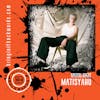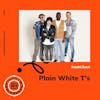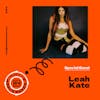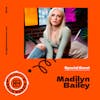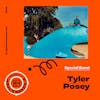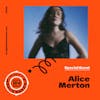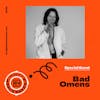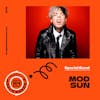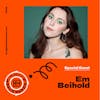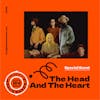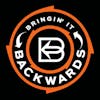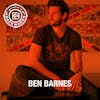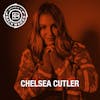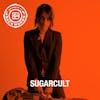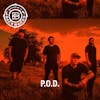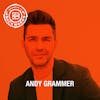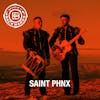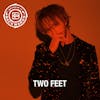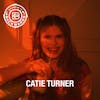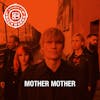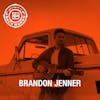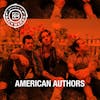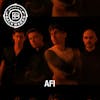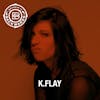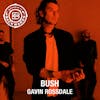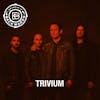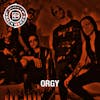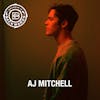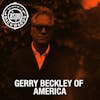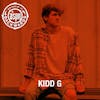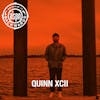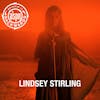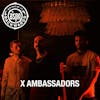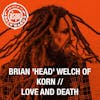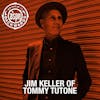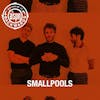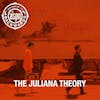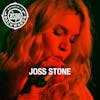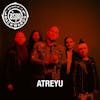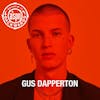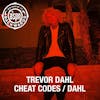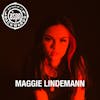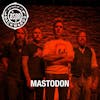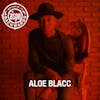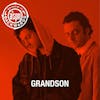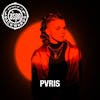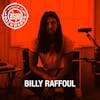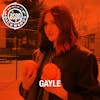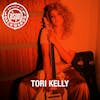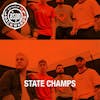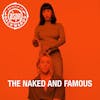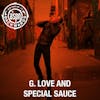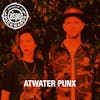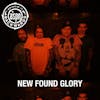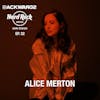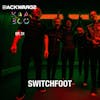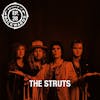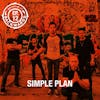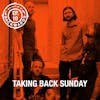Interview with Doe Paoro
We had the pleasure of interviewing Doe Paoro over Zoom video.
Nothing stays still forever, the spirit of nature growing upward towards something greater. Fueled by that understanding, Doe Paoro has spent much of the last year deep in the Costa...
We had the pleasure of interviewing Doe Paoro over Zoom video.
Nothing stays still forever, the spirit of nature growing upward towards something greater. Fueled by that understanding, Doe Paoro has spent much of the last year deep in the Costa Rican jungle, exploring ways that music could activate deeper consciousness. Today, the musician, born Sonia Kreitzer, recently released her new EP Divine Surrendering.
By deepening her connection with rituals like sound baths, psilocybin ceremonies, and the healing power of music, Paoro’s latest work allowed her to entrust in music’s potential to be a wellspring of uplift in the midst of gossamer beauty. Like the rebirth Paoro experienced in her own journey, the EP finds comfort in a constant sense of newness, growth, and transformation. Throughout Divine Surrendering, Paoro returns to grand humility, harnessing her strength by losing the self, tapping into something immense and drawing the listener to that same place.
About Doe Paoro:
Sonia Kreitzer is a singer, songwriter, and sound healer who performs under the name Doe Paoro (ANTI- Records) and lives between Costa Rica and Los Angeles. She has written songs for artists such as Peter Bjorn and John, Monogem, and Chris Ayers. Other artist collaborations include work with Justin Vernon, Son Little, and RAC. Her songs have amassed over 25 million streams across digital platforms and been featured in shows like HBO’s Girls, SyFy’s Being Human, ABC’s Secrets and Lies, and more. She also records guided meditations which have been featured on both Apple Music and InsightTimer. Sonia grew up in Syracuse, New York and has studied music over the years in India, specifically learning Tibetan Opera singing. She comes from a family of healers and is interested in music as a healing modality. When not on tour, she facilitates soundbaths, singing and yoga retreats, and music for ceremonial spaces. She is the creator of Activating the Voice, an online course and workshop series that is dedicated to empowering the voice and tending to vocal-centered trauma through singing.
We want to hear from you! Please email Tera@BringinitBackwards.com.
www.BringinitBackwards.com
#podcast #interview #bringinbackpod #DoePaoro #DivineSurrendering #NewMusic #zoom
Listen & Subscribe to BiB
https://www.bringinitbackwards.com/follow/
Follow our podcast on Instagram and Twitter!
https://www.facebook.com/groups/bringinbackpod
We'd love to see you join our BiB Facebook Group.
Hello! It is Adam. Welcome back to bringing it backwards. A podcast where both legendary and rising artists tell their own personal stories of how they achieve stardom. 0 (1m 39s): On this episode, we had a chance to hang out with DOH Paro over zoom video Del Potro is born and raised in Syracuse and New York. And she talks about how she got into music. She is self-taught as a vocalist piano player and a guitar player always loved songwriting, even wrote and recorded and released a record. During her junior year of high school, she ended up going to Ohio attended Overland college. She talked about moving to San Francisco for a year, starting a duo playing in that duel for about a year. 3 (2m 19s): Then moving to New York where she formed another band did that band for a long period of time. When the band fizzled out, she ended up taking a trip to India and really finding herself there with meditation and just learning a whole different style of music. And that's where she really found her voice. She moved back to New York and started to put together her first record, which is called soft power. She talks about putting out that album, putting out her next record, which ended up getting signed to ants. I sending a cold email to Bonnie bear, having him respond. He produced a song on the record called the wind. 3 (2m 59s): She talked, putting out her next record and all about her most recent EAP, which she incorporates a ton of her sound healing instruments. And that new EAP is called divine surrendering. You can watch our interview with Del pyro on our Facebook page and YouTube channel at bringing it backwards. It would be rad if you subscribe to our channel like us on Facebook and follow us on Instagram, Twitter, and Tech-Talk at bring him back pod. And if you're listening to this on Spotify, apple music, Google podcasts, it would be amazing if you follow us there as well and hook us up with a five-star review. 4 (3m 38s): We'd appreciate your support. If you follow and subscribe to our podcasts, wherever you listen to podcasts, 3 (3m 44s): We're bringing it backwards with Del pero Y. Hello? 5 (3m 49s): Hey Adam. 3 (3m 50s): Hi. How are you? 5 (3m 51s): Good. How are you? 3 (3m 54s): One second. Sorry. It's something in my throat. They want to like, like we're in your ear. So 5 (4m 7s): I would have been okay with it. 3 (4m 9s): Oh, that's good. Okay. Well I appreciate you being here. This is awesome. Thank you so much. 5 (4m 14s): Thanks for having me. 3 (4m 16s): Of course. This is about you and your journey and music. And we'll talk about the new AP you have coming out as well. 5 (4m 22s): Okay, 3 (4m 23s): Cool. So talk to me born and raised. Did I see New York area? 5 (4m 28s): Syracuse, New York. 3 (4m 30s): Talk to me about that a little bit. 5 (4m 32s): So funny. The thought I just had was I used to say all the time I'm from upstate New York, but then I lived in New York city and had to adjust for all the New York city folks upstate. So now I'm like central New York, you know, it was very snowy, which at the time was quite a magical thing that have appreciated a lot. Looking back, just like being in deep lizards and building like little mouse tunnels with my brother and sister in the front lawn, because it was like six feet of snow. 3 (5m 3s): Oh wow. 5 (5m 5s): They crazy amount of snow. 3 (5m 7s): I interviewed somebody yesterday the day before that was living in Alaska for a short period of time. And he was like, yeah, like we would just like, you know, dig mazes in the yard. Like that's how they entertain themselves. 5 (5m 20s): That was it. We'd put on like snowsuits and like crawl through these little tunnels that we 3 (5m 26s): That's pretty awesome. I will say. 5 (5m 28s): Yeah, yeah. Looking back. It definitely was kind of a certain magic. 3 (5m 33s): Sure. I mean, I'm, I, I think you're in LA now. Are you okay? So I'm from San Diego originally. I'm recently moved. Oh, I guess like a little over a year ago. My family and I, we moved to Nashville area or south of Nashville. And so my kids are seeing snow for the first time and like, it's so cool. Like I loved seeing it come down and I have a neighbor across the street that's from Illinois and he's like, so over it, like I thought I moved from the snow. 5 (5m 60s): Yeah. 3 (6m 1s): It was like, oh my gosh, this is so awesome. 5 (6m 3s): Totally the wonder. 3 (6m 5s): Right. It's so cool. Like I, I can't imagine growing up in that much snow to where you could dig yourself tunnels. Well, you said two siblings. Is anyone else musical in your family at all? 5 (6m 18s): No parents, no. 3 (6m 20s): Okay. What drew you to music? 5 (6m 23s): You know, maybe it was this no, I, I think growing up in Syracuse, we had such like so many blizzards and would often get snowed in. And those were quite creative periods for me, just like from a very young age to have to like, it's, I'm thinking about it now because of the pandemic. That was another stage of being closed in where I had no problem, like being really creative during it. I feel like, yeah. Growing up in Syracuse sort of prepared me for that. 3 (6m 59s): Yeah. I was going to say, I did from just what I've read about you, it seems like being kind of like alone, like isolated as kind of a happy space for you in the sense of like that's where you wrote your first record. Right. It was similar situation. 5 (7m 13s): Yeah. Completely 3 (7m 15s): Such interesting. I want to get into that for sure. So, but what, what did you learn first? Like were piano is the first thing that you learn as far as like music went or like what was the first instrument you learned? 5 (7m 25s): I am self-taught so I, yeah, I was just learning to sing. I play, I guess in high school I was, I took a few guitar lessons and yeah. But like piano is something I learned along the way. 3 (7m 44s): I am 5 (7m 45s): Obsessed with writing songs 3 (7m 46s): Or so when did you start writing? 5 (7m 49s): I made a record when I was, I think in 11th grade. 3 (7m 54s): Really? Wow. 5 (7m 56s): Yeah. 3 (7m 57s): And was that just obviously that wasn't the first record you put out, right? 5 (8m 1s): No, I get it out. 3 (8m 4s): Okay. 5 (8m 5s): Attributed it to my friends. No, the first record I put out, like officially was slow to love, which I released in 2012. 3 (8m 15s): Yeah. Okay. That's what I was thinking. So this is a record that you just, what wrote, recorded and distributed a bunch of your friends in high school. Wow. 5 (8m 25s): Songwriting. Yeah. Songwriting is always really, it's always just been a super special place for me. And especially in those teenage years, that was an outlet that felt really soothing, I guess. Self-soothing 3 (8m 40s): Would you share those songs? I mean, obviously with your friends and on this recording, but prior to that, were you sharing your songs with people? 5 (8m 47s): No, I think it was something that kind of woke up in those teenage years was that I, that was a desire. I had to write songs. 3 (8m 56s): Did you play out at all or play at the school or talent shows, anything like that? 5 (9m 0s): I play out. I I've always had like a lot and still do sometimes like performance, anxiety, weird paradox that I live in of like loving making music and then also struggling with sharing it. So I would make my way out with a lot of, a lot of trepidation trepidation 3 (9m 23s): With that, with that first record or tape or whatever you put together and 11th grade. Was that something you recorded in a studio or is it home recordings? Like, oh, 5 (9m 34s): I remember I went to a studio for that. I don't even know how I even put this together. Thinking back, I was just like, this idea became obsessive and I found a studio in the city of Syracuse and rented it for a day and just like went in there with the guitar. And that was like the days of Juul, you know, those are the, the songwriter who just went in with guitar. So I had a lot of role models of how that could go down. I think so. Yeah. Yeah. Definitely because her songs are so simple on guitar, so it was like really easy to learn them so that, I think that that was one reason I latched at that age. 3 (10m 13s): Okay. And then you were, went in the studio and you're still at first a record you released was just you and acoustic guitar. Wow. 5 (10m 23s): One day. 3 (10m 24s): Oh my gosh. That's insane. 5 (10m 27s): You know who? I think it was just like, I didn't know. I didn't know what to go into a studio was. I didn't even know that you could go for more than one day. 3 (10m 34s): Right, right. You just go in there was it, you obviously had an engineer. Did you just do it all live? 5 (10m 40s): And I think we just did like two takes for every song and I was like, cool. 3 (10m 46s): You still have that a demo somewhere? Or do you have that recording somewhere? 5 (10m 52s): It's somewhere. It's somewhere in Syracuse. I definitely did not bring it out to 3 (10m 57s): You. Weren't going to shop it around. 5 (11m 0s): No, like maybe every 10 years I'll I'll listen to it and be like mostly cringe, but then there's also like this real resilience in it that I appreciate. And like the seeds of something. 3 (11m 14s): Yeah. For sure. For sure. So from there you knew that you wanted to pursue music. It sounds like. I mean, being in 11th grade, putting out a record like that, did you, where did you go from there? Did you try to attend college for music? I didn't see. You did some traveling, right? 5 (11m 30s): Yeah. I, I didn't, like I said, I never really formally studied music in college. I went to a school that had a music conservatory and I think I was quite intimidated by the fact that I didn't have a formal education in it. So I took like, you know, I took sitar and I, I kind of studied like ethnomusicology, but I, I didn't actually go into songwriting there, which I wish I did. 3 (11m 58s): Was that a school in, what was that like around New York area. 5 (12m 2s): Oh, Oberlin. 3 (12m 4s): Oh yeah. No way. Yeah. That's crazy. Okay. So my great, my grandmother, my dad's mom went to Oberlin. Oh, 5 (12m 11s): Wow. 3 (12m 12s): Yeah. Like I have her, she passed away when I was like four, but my grandfather, his wife passed away like three or four years ago. And he was like my hero, but we were going through his stuff and I found my grand mom's report card from Overland college. Like, it was crazy just like, it was just like the slip of paper, like this big. And we went and visited it before. It's such a cool little town. Like it was just my family that was in or there from Elyria. I don't know if you ever went through there. 5 (12m 44s): Of course. Elyria. Wow. 3 (12m 46s): Yeah. So that's fairly close. I think it's the only what, like 20 minutes or something like that to overload. 5 (12m 51s): That's the town. I think Tony Morrison, the author is from Elyria. 3 (12m 55s): Is he really? That's crazy. 5 (13m 0s): Wow. And that's so cool because Overland, I believe was the first school to admit women. 3 (13m 7s): I think it was, I think it was two. 5 (13m 10s): So how cool that your grandmother was probably like, 3 (13m 14s): And one of the first people there. Right? I mean, she went to school there, I think in the early forties. So I don't know when the school, I mean, it's out now. I want to do some deep dive because I didn't realize that I had now. It makes sense. I think it was the first that let women in and she went to for vocals. She was a singer. Oh, 5 (13m 34s): Wow. 3 (13m 35s): Yeah. So that's crazy. So, oh my gosh. And that's such a cool town. We went, I took my winter with my, my grandfather, cause he wanted to show me like this. Cause I didn't even know this existed. I'm like, this is like a cool arts college in the middle of Ohio and like outskirts of Cleveland, like what is this? And there's this little, we went to this little like brewery type restaurant there on the corner. It was cool. It's such a cool little town. 5 (13m 60s): Yeah. It's a really special place. Yeah. It was, it was a formative time for sure. 3 (14m 8s): But like what did you guys set the law? I mean, there doesn't seem like there's a whole lot to do. And don't like in the area that it's at, did you lik go out around, like you have to drive out to like an uncle's an Amherst, you know, Amherst. 5 (14m 20s): I mean, there were people like the city, especially kids from the city, they would go a lot to Cleveland. It was like another Syracuse situation, right. Where there's nothing to do. So it's just like the perfect space to be hyper creative because you just need to create your own world. 3 (14m 35s): Sure, sure. 5 (14m 37s): So that's what I felt like Oberlin was, it was like a bunch of people who were creating worlds together in the middle of Ohio. 3 (14m 44s): Yeah. That's so cool. And like I said, it's such a cool, like it's such a cool looking school. Wow. So did you went there for four years? Did you end up leaving there or 5 (14m 53s): I, you know, in the end I only went there for three years cause I went to another school first and then transferred out. 3 (14m 60s): Okay. So did you go to Oberlin to pursue music, man? It sounds like. 5 (15m 5s): No, I didn't. I think subconsciously I was like, you know, I want to be around musicians and certainly all the musicians, friends that I made there, you know, were people that definitely, I think, yeah, that, that was a big part of my path after college, but I studied painting. I was a visual artist. 3 (15m 26s): Oh cool. Yeah. 5 (15m 29s): I don't, it was a weird thing. I was like obsessive the painting for seven years of my life and then just stopped 3 (15m 36s): A really interesting, 5 (15m 38s): I don't know. I, there's not like much of a story there except I just got really, I think I burnt out and lost interest. The collaborative aspect of music really enlivens me. And I think some of the soulfulness of painting is, is a lot. 3 (15m 55s): Yeah. And where'd you go from? So you left Overland, you went to, you said at a different school after Oberlin. Okay. And then from there did, where did, what was next for you 5 (16m 10s): A year? I did a year in San Francisco and then I moved to New York. 3 (16m 14s): Oh wow. Okay. What'd you do? I lived in San Francisco for a little bit too. Did you move to San Francisco just to kind of change the pace, pursue a different or where are you going there for music as well? Or just, 5 (16m 26s): I had my friend <inaudible> he's in this, his band is called the California honey drops. He went to Oberlin and when I graduated, I wasn't really sure what to do. And he was like, I think you should move out to San Francisco and start a band and play music here and I'll help you. And, and so he did, he kind of, I moved there and he mentored me and I started like a little duo that I played with. And then I was like, I think it's time to move to New York. 3 (16m 53s): Did you, how long did you play in the deal for? 5 (16m 56s): Probably like most of the year. I think I did. Yeah. Maybe it was like a nine month thing where I kind of saw what it, like, I started to understand how to do that. We'd play. We would play the hotel Utah every week we go there. 3 (17m 13s): I never did. I know that I know the spot. I never went there though. 5 (17m 18s): Yeah. It's I don't know if it's around still, but it was like a very cool open mic, really supportive scene. And I started to see how that could work a bit. 3 (17m 29s): Okay. And then did you, from that group, did you end up kind of, is that where you started to kind of pursue a solo career? 5 (17m 37s): Yeah, it was. We actually made an EAP. The group was called having with your group phone and the person who recorded the EAP, Nate he's actually in that band tune and he was from Oberlin. So that was, yeah, it was like more Overland connections. 3 (17m 56s): That's cool. That's cool. And then did you, you went to what traveled like the Himalayas? Is that what I was reading about you or is that later or was that 5 (18m 6s): Sure? I moved to New York and then I was pursuing, I had like another band that I kind of took to its natural end. Like just, it was me sort of working through a lot of the kinks, I think in doing a music career while waitressing. And 3 (18m 20s): Was that something you were taking, like you wanted that to be like the thing, like trying to get signed and like touring and everything with that band in New York? 5 (18m 27s): I was, yeah. I was definitely trying and couldn't like, it just, I, I couldn't figure it out. I couldn't figure it out. And so then, yeah, so I think like 10, 11 years ago I went to India and my plan was actually to just stop pursuing music and 3 (18m 50s): Really, 5 (18m 51s): Yeah. Yeah. That was my plan. I was like, I, I can't figure this out. 3 (18m 57s): And you do, you just went there to what? Try to find what you wanted to do next. Find your next, the, yeah, 5 (19m 3s): Yeah. 3 (19m 4s): Your life. I guess 5 (19m 6s): I did. I wanted to get my yoga teacher training. I knew that was something I always wanted to do. And I wanted to do a Vipassana meditation at the main center there it's like a 10 day silent meditation retreat. 3 (19m 20s): Oh, wow. 5 (19m 21s): Yeah. 3 (19m 22s): What was that like? I actually had a buddy that did something similar where he went somewhere and like, you just don't speak for like a week. He did, I think his was like six or seven days, but 10 days you just kind of is that w was that, I mean, that must've been, so was it difficult? Like tell me about this. 5 (19m 40s): It was so surprising. I think it definitely was difficult. And also like what I found most surprising about it was that when we had to start talking again at the ninth day, cause they have like a day where they, you begin talking to everybody on the course. So to integrate the process before you go home, I didn't want to talk. That was what surprised me the most 3 (20m 3s): Really? 5 (20m 5s): I felt so like at peace I was shocked. 3 (20m 12s): Okay. Wow. That's a fascinating, oh yeah. I was going to say you almost like maybe the muscle memory would get weird there. I mean, I don't know. 5 (20m 22s): And my voice was definitely a bit higher, but I remember just being like, the silence was so deeply peaceful that I think as soon as I started talking, I excused myself and then just had to cry for a little. I was like, 3 (20m 36s): Wow. A 5 (20m 37s): Lot to process. But there's one in Massachusetts. There's a center in Shelburne, Massachusetts that I had done one at when I was like 26 and then a year later, went to India and did one there. 3 (20m 49s): Wow. And then when you get back from there, is that, when do you, cause your sound is so unique, you fear for your project. Yeah. And was that something that you developed there? Was that similar to like when you were pursuing your first band in New York? Does it sound anything like what you're doing now? 5 (21m 7s): No. No, not at all. I think so what happened in India was I was traveling around for a bit. I did the some teacher training. I dropped out of yoga, training, teachers, training school there and ended up, I ended up finding a really amazing teacher later on. And I ended, also ended up finding this Tibetan Institute for performing arts, which is yeah. A school. And I started studying singing there when, yeah, in that first trip to India, I heard, I, either way I found out about it was I heard this somebody singing while I was walking and the singing was so a theorial 3 (21m 52s): Oh, it's just totally different than anything you had ever heard before. 5 (21m 56s): Completely like, like mind bending. I didn't know that the human voice could do that. I was with a friend. I was like, Hey, do you mind if we check out what that singing is? I like need to know. 3 (22m 8s): Right. Right. 5 (22m 9s): And, and when I got there, yeah. I ended up learning about Tibet and singing and it was, they were teaching all sorts of Tibet in traditional Tibetan instruments and theater and opera. And yeah, I asked if I could start studying there and that really changed my voice because all of a sudden I realized I could sing super high notes that I never had access to or thought was possible. And it just, it really opened something up for me. 3 (22m 45s): Did you end up staying there for a while? Like mean how long did you study at the school for? 5 (22m 49s): Yeah. So that was the beginning of like a longer relationship. I, the teacher who agreed to take me on was like, look you, I can teach you one song, we'll start with one song. And or on that song, you have to come every day for a month for an hour. 3 (23m 4s): Wow. So you get essentially just like, did you, when you went out there, were you going in with a one-way ticket knowing that you want to maybe stay or like, I mean, for me, I would think like if I was going to another country and then I'm like, oh, this seems like something cool. And he's like, you've got to come back every day for a month. And it's like, okay, now I've got to figure out a place to live. Like I, you know, I got to get a job. Like, are all these things start running through your mind? 5 (23m 29s): Totally. I mean, I was only planning to be in this town for two days, but I remember the thing is I remember that being such an instant commitment. Like it was doubtless. I was like a hundred percent. Yes. I want to stay here and I'll change my plans. And it was just so clearly something I needed to do. And so I did that and then I started coming back like every other year I would go back and study PR pretty much the same thing. I would just go to that one place in India and then study for like, you know, a month to six weeks with that teacher. 3 (24m 2s): Wow. And then did you start, is that when you started to kind of use that style, like, is that similar to the style that you use now in your, in your songs? 5 (24m 11s): I think it's integrated. Like, it's just a part of my voice. I was thinking from a much lower space before, like a, what they would call lower placement. And now I sing from a much higher placement and it's definitely from everything I learned there. 3 (24m 29s): And is that like, cause you on your website, you said that your sound healers, that's something that kind of comes from that. 5 (24m 35s): Definitely, definitely learning to use my voice in that way. 3 (24m 39s): Like to explain that to me and that, cause that's something I was fascinated by. I was just like, I dunno, remember like a couple of years ago it was just like I got in some rabbit hole on YouTube and then I found like different frequencies can stimulate different parts of your brain, like the Vegas nerve. And like, I'm just like, whoa, this is like crazy. And like you, you put your headphones on and like one, you know, it's, it's like one frequency in one ear is at a certain level and the other's at a different level. And they're like, and I was like, this is crazy. And I looked, I was looking at your Spotify and then you have a record that's in like 4 30, 2 Hertz. And I remember seeing something about that because the mainly stuff that you hear recorded or like wave files or MP3s are in four 40. 3 (25m 20s): So I'm like, oh, like what's this for 30 some Googling that. And like, is that all kind of like, are you, did you learn about different frequencies? Like tell me, tell me about like this whole, is that all incorporated the sound healing or am I just going totally on tangent? 5 (25m 34s): No. I mean, it's things that I've learned along the way. And when we were making that record, I remember actually did a lot of research on 4 30, 2 Hertz at the time, because I wanted to make sure it wasn't just woo, like made up woo. You know, fake news. 3 (25m 52s): Right, right, right. 5 (25m 54s): But there is a lot of research that's been done where they've tested it and they've tested 4 30, 2 Hertz clinically that shows listening to music at 4 32 Hertz does decrease like anxiety symptoms. 3 (26m 11s): That's so crazy. So like when, when you say sound healers that, are you going with those like that? Like, tell me, I guess you explained to me, I have no idea. I'm just making, I'm just spouting because it's just so fascinating to me. Like, is that something that you take into consideration when you're recording a record? Like the, the, the hurts that are you're being, what it's the songs coming out at or anything like that? 5 (26m 34s): Definitely. With the music, that's more like specifically in this sound healing, like I'm putting out another record probably later this year with float waves, the same person I did that first 4 32 Hertz. And we'll play with different frequencies for that. But the sound healing refers to kind of like a spectrum of instruments. I have like crystal singing bowls and songs and percussion. And it's a mix of different things. People do like offer sound healing in different ways. I think one thing that I do that some don't is I also, I use those instruments and then I also use my voice. 5 (27m 14s): And the idea is kind of what you were starting to riff on that, like everything has its vibration and frequency and music can be this. 0 (27m 26s): If you're into design of furniture and you want the sofa that broke the internet, you don't have to go broke to get it. Because designer looks, furniture has all the same styles and trends and all the quality, but without the designer prices check them out. Designer looks at value, city furniture or designer looks.com 5 (27m 43s): Sort of passive way. We can passive in that. You don't have to do anything. It's not invasive. It's not, but it can restore harmony to the body just by being in the presence of certain instruments or frequencies. And it sounds so woo. But I always say before I do sound healing. I'm like, you can come in with your skepticism and it's all good because it'll work nonetheless. And it usually does. Yeah. 3 (28m 9s): Oh see, do you do sound healing? Like, cause like a sound, a 5 (28m 14s): Sound bath. 3 (28m 14s): Yeah. Sound baths, right. There's a, where people kind of come together and they just kind of like, it's almost like you're meditating and then somebody's playing like different instruments. Right. I mean, I can't remember who I interviewed somebody that was putting on something like that in Los Angeles. Like, I can't remember who it was though, but like it's like different instruments, right? That you, it's not, you're going to go on. It's not like a show show. It's like you go into kind of meditate, right? 5 (28m 42s): Yeah. It's a lot more experiential. I mean, there's some amazing sound baths, you know, facilitate facilitators in LA, but yeah, it's very experientially. People are lying down and the line down is supposed to promote this state of receptivity and yeah. 3 (29m 2s): Is that something you learned? Do you, do you play those, like, do you play the instruments and kind of ran run the, I don't even know what you would call it, like the ceremony. 5 (29m 12s): Yeah, definitely. I do. I have, I mean, here's a, I have a sound bowl right here. I have kind of these, I have a gong, I have all sorts of percussion and chimes and tuning forks and yeah. 3 (29m 27s): How long did it take you to learn all that? 5 (29m 30s): Well, I think I was slowly learning it, right. Like I was learning it. I was learning how to do it with the voice. You're my teacher in India through the Tibetan lamo style. And then I was also learning about how music can work as a healing, because I was studying for many years, going down to Peru and learning about Iowasca and a big part of the lineage that I was sitting in is one in which music is used as a way to activate healing through these songs that are called the ECOS. And so that was a big like mind opening thing too, of like, wow, there are all these cultures where songs are really considered legitimate medicines and activation of music, of healing, personal healing. 5 (30m 22s): So those two things were happening while I was touring as like an indie musician. 3 (30m 30s): Yeah. Okay. Wow. Yeah. You're learning all this. And as to w w were you touring like that record, the first record you put out or like w where, like what, where were you at as far as your music were that career path versus what you were doing there? 5 (30m 46s): I mean, it was like, I was living two different lives, basically any cause I was, you know, I toured and then I signed to anti records and I put out whenever I wasn't touring or working on a record and had some extra cash, I would be like investing in my kind of spiritual path. 3 (31m 5s): Interesting. Yeah. That's so fascinating to me. And did it take a while to learn how to play the, all the different instruments? 5 (31m 13s): Yes, but it came really naturally because basically at a certain point, I was like, this is super unsustainable. I'm like keeping, I'm like having a secret spiritually, but it's just like immense and important to me. And I'm keeping it separate because I don't understand how it can work with this other lifestyle that feels actually quite unhealthy. 3 (31m 36s): Huh. Are you able to blow and let's you at all or did that, 5 (31m 40s): And that's kind of what happened at the end of like 2018. I was like, I just want to focus on music as a healing practice. And there's this woman out in Joshua tree who makes drums, she teaches, she does like drum ceremony where she, you go out there and you make a drum with her. And, and that was the, my beginning. I went out there for my birthday and made a drum with her. 3 (32m 6s): Really? 5 (32m 8s): Yeah. And then that was kind of like the start of my sound. It was so funny. It was like, that was quite the initiation. And then I just started learning from different people and getting instruments and playing and, you know, yeah. 3 (32m 22s): Wow. Okay. As well, tobacco real quick on that first record. So to love, tell me about putting that out. I mean, it's going back to the isolation thing. Is that something that, did you, like you recorded there? Tell me about the recording of the record, right. It sounds like you went to a cabin or something. You just kind of like isolated yourself. And what, what decision did you like? What was the decision behind that and how quickly were you able to put the record together? 5 (32m 49s): That record came together so fast. It felt like deeply channeled. And I knew it because for years, like I mentioned, I was in New York trying to make things happen with this other band. And I writing every song just felt like this, pushing a Boulder uphill, like trying to get, trying to squeeze inspiration out of nowhere. And, and all of a sudden I got back from India and the songs were just like moving through me. I would have a conversation with somebody. And I was like, that's a song. I was finding inspiration everywhere. So I, I had like, no option. I was like, this is it. 5 (33m 31s): I've never been here before in this place. I need to make a record. And, and so, yeah, I, I rented a little cabin out in outside of Syracuse and went up there for just like a week to kind of figure out what, what I was going to do. And that's where I started. I just was writing songs and I brought a little keyboard up there and kind of the first song I wrote for that record is called follow util. That one I wrote with guitar and I, yeah, I just like made it on garage band and that was so new to me. I was like, oh, I can record myself and I can write a song. 5 (34m 12s): I can do this all by myself. But obviously it would be great if I had somebody else to help me with this. So, 3 (34m 20s): And you ended up hiring here, you ended up having somebody come and record the record. So you didn't do the whole rap record on garage band. 5 (34m 27s): I did not. I did not graduate and not do the whole record in that cabin. That was kind of just like my preproduction visioning station. And I did do that song up there. And then when I was out there, I was like, I should call Adam. And Adam was my super 3 (34m 45s): Old I answered. 5 (34m 49s): And then you were like, yeah, we should do a podcast. And 12 3 (34m 52s): I'm like, yeah. You know, we'll do that. So like, if there's going to be this pandemic and then we'll do it after the fact. 5 (34m 60s): Yeah. You know, and my friend, Adam Rhodes, who I grew up with and is just an insane musician, really brilliant, sensitive person. And we recorded and wrote most of the rest of the record together. 3 (35m 14s): Wow. And w when that record's done, did you like knew you had something special? Did you try to then go out and just play those songs or tore those songs or to pitch those songs to a record label? Like, what was the kind of the next step for you? 5 (35m 28s): Yeah, I knew, I knew I had something different because we played the first show we played was at pianos put spot in New York. And, and it was real. It was filled with people that I didn't know. And I was like, well, this is new because for so long, I'd been playing New York and with my old band, and it got to a point where I was like, I'm feeling bad about asking my friends to come to my shows. And all of a sudden there was like this organic thing that was happening and everything kind of, it was like one thing to the next. And they say this about, I don't know. I don't know. 5 (36m 9s): They, my friends it's like every time you release a song, it has the potential to change your life, like writing and releasing it. And I think it does, even if only, you know, that you did it, but then there's something natural that comes where it also leads you on your own journey. And that's kinda what started happening with those songs. Like from playing shows, we'd have managers show up and, you know, public, there was just like all sorts of things that was, were created from that. 3 (36m 41s): That must've been pretty exciting though. Oh yeah. 5 (36m 45s): It was exciting. I was also in an initiation. I mean, I didn't know anything about the music business. I didn't go to school from it. I didn't have anyone in my family. It was from Syracuse. So it was like a super naive 3 (36m 58s): And you have to learn pretty quickly. 5 (37m 0s): Yeah. And I'm still learning of course. 3 (37m 3s): Sure. Cool. Well, it took you a handful of years to, to put out then that next record, which signed with anti right. Was it just more, was it just grinding and touring and trying to write and write and write, like, what was the path in between those two albums? 5 (37m 19s): Yeah. So that first record that I released, I became very obsessed with licky Lee's record at the time. And I looked at the record and saw that this guy Lawson Martin had mixed it. So I reached out to him. That was like, my thing was, I was always willing to like robe, be super Rogan. Just females, 3 (37m 45s): Put yourself out there. That's awesome. 5 (37m 46s): Yeah. I just found his email and emailed him and was like, Hey, this is my music. Would you be interested in mixing one of the songs on slow to love? And he did. And from mixing that he makes this song called, can't leave you. He was like, actually my wife and I are looking to start a publishing company with BMG. 3 (38m 5s): And 5 (38m 6s): Yeah, why don't we sign you and bring you out to Sweden and you can write with a bunch of our songwriters here, learn the, learn the Swedish way. 3 (38m 15s): Wow. Off a cold email. That's crazy. Wow. Okay. So then do you move out to Sweden or go out to Sweden to, to write? 5 (38m 26s): Yeah. So this is again like Swedish winter, you know, back to Syracuse and Oberlin, like just locked down 3 (38m 33s): Your spot. 5 (38m 34s): Five hours of sunlight and like a day, just every day. I think I wrote 30 songs in a month. 3 (38m 43s): Oh my gosh. 5 (38m 45s): I felt sick. I felt so depleted afterwards. 3 (38m 50s): It was slow to love done at this point. Was that record finished or did some of these songs end up becoming a part of that album 5 (38m 57s): That was done? It was out in the world. I really, I didn't want to sign that. I wanted to self release it. Cause I was like, this is, I know it's imperfect. I know it's raw. I know there are things I want to change later, but it's so pure. And I just need to have a record of something I made that's from a very pure place. So yeah. So this was in preparation for my second record. And then I got very lucky again with a cold rogue email, which is how we made the second record because Adam had come up with this amazing song. He had written the piano part, and then I wrote the lyrics and we were both like, we have something super special, but we can't take it to the finish line together. 5 (39m 41s): We need somebody else who knows more about production in either of us. And I sent it around to a few friends to be like, what do you think? And two out of three of them came back and were like, you should reach out to Justin Vernon of bony VAR. 3 (39m 56s): Wow. 5 (39m 57s): Yeah. And, and yeah. And I had a manager at the time who was like, you know, you're not a very big artist. Like you shouldn't just wrote, like, I wouldn't say 3 (40m 9s): Shouldn't be just rope emailing people. 5 (40m 13s): And I did, and yeah, Justin's manager at the time reached out like reply. I sent it and had, I had no expectation to ever hear back. Of course. And then he was like, actually, I've, we've, I've heard your first record, which was so weird. Cause I didn't think many, I mean, it was a really small, you know, record that we self released on band camp. Like 3 (40m 39s): It, 5 (40m 41s): He was like, I actually heard borne whole the song and we love the song that you sent us and Justin we'd love to produce it. 3 (40m 49s): Wow. Did he produce that whole record then? 5 (40m 53s): So he produced that song and 3 (40m 55s): Then the song, what song was that? 5 (40m 57s): It's called the wind. And you could hear it, like you can hear especially things he was doing at that time with like the <inaudible> that are on that song. And then from that record. Yeah, from that one song, I ended up going with it with Adam, my friend, Adam out to Wisconsin and we made the second record with, he was there for some of the music, but it was mostly produced by BJ Burton and Sean Carey 3 (41m 24s): Really that's so cool. What about, so then what happened with the Swedish songs? They just didn't ever come out or 5 (41m 31s): They came out like, you know, some of them didn't separate 30. Right. So we took lots of them and those were the songs that I used for after. So the guys from, yeah, like that whole camp basically produced the songs I'd written in Sweden. 3 (41m 46s): That's amazing. Wow. Okay. So then once that second record comes out and then obviously that's, the wind is a huge, huge song and you obviously knew there's something special there. Then, you know, he produces it. Are you, you signed with anti was that must have been a big moment. 5 (42m 2s): That was a big moment. It was a, it's an interesting, it's very interesting because another super lucky, this is just like this extremely lucky time in my life. That happened right before I went out to Wisconsin, was this guy from island records, UK, Nick Szymanski. He was actually Amy Winehouse, his first manager. 3 (42m 24s): Wow. 5 (42m 25s): Heard two singles I've made in between slow to love. And after that, we made for this small label called white Irish records and songs were called new lows and see me now. And he was like, I want you to come out to London to meet you. And so he flew me out to London and was like, I think we should make a record here on islands. And it was such a cool opportunity. But I ultimately decided at the same time, I had this amazing offer to go to Wisconsin and do things a little bit more on my own terms. So that was sort of the two roads, major label and more independent. 5 (43m 8s): Right. 3 (43m 9s): But Anton is such a cool label. I mean, obviously it's epitaph is like, it w it was because epitaph is so straight up the middle with what they signed. Right. I mean, it's bad religions label and the, what they signed was just punk rock and in that, but then they put out anti, which is a bunch of different genres of music. 5 (43m 29s): Totally. And, and when I signed to anti, so it was after we made the record, we sent it to anti and they wanted to sign it. When I signed to them, it just felt like, I felt like I was really at the right place. I, they have a lot of respect for artists doing their own thing and independence. And I really felt like I was honoring myself and my, my decisions and that it had worked out. 3 (43m 57s): Does Greg Gaffin get involved at all? Did he get involved at all with that piece of it? Because he, you know, he runs epitaph and I know he gets involved quite a bit with the artists and in that process of it, or was it when, I guess you had the record done. So he wouldn't, but you did put out another album with anti didn't. You 5 (44m 14s): And I put out two records and my main point of contact there's Andy Caulkin who's. Yeah, he's wonderful. And he, it was interesting when he first signed after he just getting into meditation. So that was something we had in 3 (44m 37s): Cognitive. 5 (44m 38s): Yeah. And it felt like, again, it just felt like another green light of like, I want to be working with people who understand the full spectrum of what I'm trying to do here. 3 (44m 47s): Oh, it's Brett Gershwin. I named the wrong bad religion member. 5 (44m 53s): Okay. I was like, I don't think I was like, did I miss someone to anti all these? 3 (44m 57s): No, no, no. That was my fault. Cause then I'm like that, that wasn't right. I just wanted to clarify for everyone going you're an idiot. Yeah. So, okay. So he wasn't involved in it at all in that point or when you were working through them, but that's so cool. I mean, what a cool label you get signed to them and then do you go on the road right away with like, what was the benefit? I mean, aside from having them put the record out and everything else, like getting on anti, how did that change your career? 5 (45m 29s): I mean, I learned so much, like I learned so much about the music industry from kind of seeing how that worked in ways that now, you know, I'm back to being independent. Again. I, I think I have just benefited so much from being on a label in terms of knowing how to be independent. It's interesting in that way, it's like being really gave me independence, but yeah. Then we did a bunch of touring and it's funny when I was at, in Wisconsin, there was also another band they're finishing their first record. I know bandwidth Sylvan. So yeah, it was so, so they saying Amelia saying on my record and Nick from Sylvan, Esso is playing bass on a few songs. 5 (46m 15s): And 3 (46m 16s): Really, 5 (46m 17s): Yeah. And so then we went on tour with them for a few shows. I did a bunch of other touring in that time too. 3 (46m 24s): And then you put out your next record and what was the, like, that was 2018. Is that what a song? What was the milestone, would you say from that album? Or how did it change? 5 (46m 37s): I think probably what changes that I was now living in California and I was kind of returning to a more like folk folk, inspirations, songwriter inspiration. And I got to make that record in London with Jimmy Hogarth on the Amy Winehouse Frank album. So that was cool. Yeah. That was amazing. Cause I, and I got to kind of combine both worlds. Like Amy Winehouse was a huge inspiration to me was a huge inspiration to me. And in the end I got to work with 3 (47m 12s): Work with both when you came to that fork. 5 (47m 15s): Yeah, totally. 3 (47m 15s): That's cool. That is really cool. So with this new record or the new EAP that you have coming out, when did you start this? Like obviously isolation hits again with COVID in 2020. And you talked about being super creative during that. Like when you have those moments, did you feel that same way once the world's shut down or did you not get the same, you know, creative vibe from, from obviously a forced isolation versus the other ways you wrote music? 5 (47m 48s): I think, look, I was missing the inspiration that comes from just relating in the world. That's where a lot of my music comes from. But luckily I was like, I'm trying to make a different type of music, this music that is ceremonial and healing. And these were songs that had been kind of floating in my consciousness for many years, but I'd been wanting to make and put to recording. And this was like another really mystical coming about during the pandemic I had applied to get a master's and social work. 3 (48m 27s): Interesting. 5 (48m 28s): Yeah. I was like, maybe there's a way to combine therapy and music. And I was really deeply just like impacted by witnessing the mental health crisis happening. And so that was something I applied for and got accepted to a program in New York and I was contemplating going, but I wasn't sure for a lot of reasons and a mentor of mine was like, I think you should do this meditation practice where it just like set up a little altar and you have to give something up. So like, you know, I gave up coffee. I don't really, you know, for 10 days and you meditate just for 30 minutes in the morning, 30 minutes at night and you meditate with a question. 5 (49m 14s): So like, my question was, what is the best path for me to be of service right now? And I had done a lot of writing on it and I just sat in front of this altar everyday for 10 days. And I was like, I don't, I was just trusting his guidance because I didn't have know how it was going to play out. And on the seventh day I had a missed call from a friend of mine who had met in an Iowasca ceremony, who is a musician and he left me a message and he's like, you know, I was just sitting and meditating and thinking about you and wondering when you're going to make your medicine record. And I called him and I was like, you know, I really want to make it. I'm just not sure of the, how, how to find out how to do it. 5 (49m 56s): And he was like, I'm going to help you make it. And he's a producer and he, that was it. We started working together. 3 (50m 2s): Wow. Wow. So did you, so you implemented those sounds in like the, the, from the sound bass and all the other stuff that you were doing into this record? 5 (50m 11s): Yeah, for sure. Okay. 3 (50m 13s): And, wow. Okay. So the totally different approach was that hard to write in that head space, I guess it's, I'm sure it's a lot different than putting the earlier records together. 5 (50m 24s): It was a lot different because I'll tell you it was different. This is the earlier records. It's like I would write the songs and, and then like we would figure the songs out in the studio. And some of the songs from this record were songs I'd already been playing for years. It was more like, how do I do them justice in the recording process? And it just, the whole thing was quite, was really intuitive. 3 (50m 54s): That's cool. And then how do you, I mean, to create a record, did he, did it, I mean, I guess my question would be like, did it come down to some of those frequencies that was that stuff you implemented in the album? Or is it no, just like, okay, I'm going to use these, these instruments that I know I could, that I use during the, the, you know, these healing BA sound baths and all that stuff. Like, how did you, how did you like tackle the record when it came to those specific things? 5 (51m 24s): Yeah. I think we used a lot of my instruments that I use in sound baths to give it shape. And then, and then also the, like the lyrics were just songs that I had written. It's not, you know, lyrics were songs were trying to figure out the best way to say this, like downloads I'd had in my personal work with medicines that I'd been wanting to give form to for awhile, you know, things I'd written down years ago that I was like one day, this will find a song and then they finally did so 3 (52m 0s): Amazing. That's so cool. And do you plan on w like for this record, would you approach it differently when it came to like touring it? Or would you want to, instead of playing maybe like a rock venue or like a different, would you like, are you going to do a different take on that? 5 (52m 18s): For sure. I mean, I'm doing lots of like private events and private shows, but for like the bigger ones, I think I want to keep them in the experiential space and the, so yeah, like inviting people to lie down or, you know, instead of being sitting and kind of rigid, I don't know. I see, I see it like a lot of outdoor spaces. I don't see myself standing up. I see myself like sitting down and surrounded by my instruments and just getting to kind of do different things. 3 (52m 52s): That's so cool. 5 (52m 53s): Yeah. 3 (52m 54s): Amazing. Amazing. And the record's coming out soon right next to the next week or so the week after 5 (52m 60s): It's moving so fast. June count. 3 (53m 2s): Yeah. Wow. Wow. Awesome. Awesome. Well, thank you so much for doing this today. I really, really appreciate your time. 5 (53m 8s): Yeah. Thank you so much for inviting me in and giving me the space to share. 3 (53m 12s): Of course, this has been great. I have one more quick question. I want to know if you have any advice for aspiring artists. 5 (53m 21s): Yeah, definitely. Definitely make your art. You owe it to yourself to, to see through your creations. I think one thing that is present right now as after this interview is like, and never be scared to reach out to somebody who you think might resonate with your music and be rogue there's no, there's no one way. There's no one path for anyone. So trust your unique path.
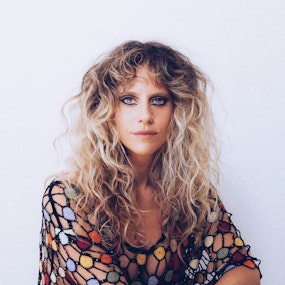
Doe Paoro
Songwriter
Sonia Kreitzer is a singer, songwriter, and sound healer who performs under the name Doe Paoro (ANTI- Records) and lives between Costa Rica and Los Angeles. She has written songs for artists such as Peter Bjorn and John, Monogem, and Chris Ayers. Other artist collaborations include work with Justin Vernon, Son Little, and RAC. Her songs have amassed over 25 million streams across digital platforms and been featured in shows like HBO’s Girls, SyFy’s Being Human, ABC’s Secrets and Lies, and more. She also records guided meditations which have been featured on both Apple Music and InsightTimer. Sonia grew up in Syracuse, New York and has studied music over the years in India, specifically learning Tibetan Opera singing. She comes from a family of healers and is interested in music as a healing modality. When not on tour, she facilitates soundbaths, singing and yoga retreats, and music for ceremonial spaces. She is the creator of Activating the Voice, an online course and workshop series that is dedicated to empowering the voice and tending to vocal-centered trauma through singing.
Featured Episodes
Here are some great episodes to start with. Or, check out episodes by genre.
























